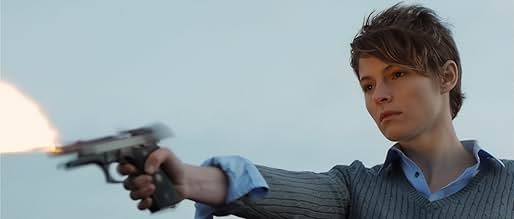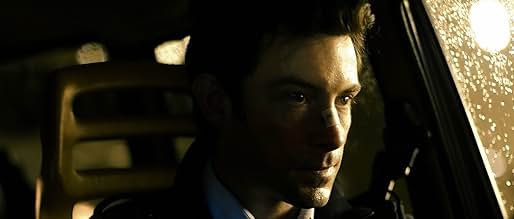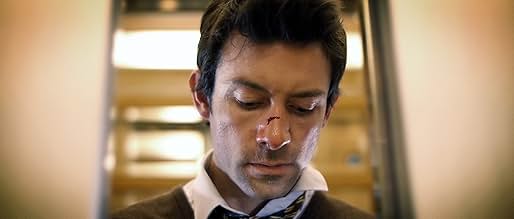A man and woman are drawn together, entangled in the life cycle of an ageless organism. Identity becomes an illusion as they struggle to assemble the loose fragments of wrecked lives.A man and woman are drawn together, entangled in the life cycle of an ageless organism. Identity becomes an illusion as they struggle to assemble the loose fragments of wrecked lives.A man and woman are drawn together, entangled in the life cycle of an ageless organism. Identity becomes an illusion as they struggle to assemble the loose fragments of wrecked lives.
- Awards
- 5 wins & 35 nominations total
Andreon Michael
- Peter
- (as Andreon Watson)
John Walpole
- Bank Investigator
- (as Trey Walpole)
- Director
- Writer
- All cast & crew
- Production, box office & more at IMDbPro
Featured reviews
After this movie ended, I was dumbstruck. I sat looking at the end credits, searching through what I had just watched, remembering the film vividly, and yet having it still be a blur.
Upstream Color is not a literal movie. The plot is never explained directly to the viewer, and the actions taken by the characters are unclear in reason and motivation. The most obvious things I could say about the movie are that it is filmed very well, and it has a nice musical score.
But the movie is not about literal plot. It's not about literal characters. It's about feelings and thoughts. It's a movie about broken people trying to fix themselves. There are things everybody in the movie will understand, and there are things nobody will.
It's a lot like music. When you put on music, you know the mood, and you know the melody, and you know the tempo and the harmony, and it can be a beautiful experience, even though you have no idea what the lyrics mean. And upstream color is a lovely, almost meditative movie about the lives of everyone being interconnected, and about how when people form companionship they start to become one, and yet someone else may say totally opposite things than I'm saying, and they wouldn't be wrong.
It's not a movie for people that think a film must have a literal story. It's not a movie for people who won't watch an hour and a half of meditation. It's not for people who see movies to see stories. And there is no shame in disliking this movie. But if you can appreciate an abstract story and can sit through an hour and a half of meditation, this is the movie for you.
Stanley Kubrick said in his later years: "A film is - or should be - more like music than like fiction. It should be a progression of moods and feelings. The theme, what's behind the emotion, the meaning, all that comes later." If Stanley Kubrick were alive today, I think he would have liked this movie a lot.
Upstream Color is not a literal movie. The plot is never explained directly to the viewer, and the actions taken by the characters are unclear in reason and motivation. The most obvious things I could say about the movie are that it is filmed very well, and it has a nice musical score.
But the movie is not about literal plot. It's not about literal characters. It's about feelings and thoughts. It's a movie about broken people trying to fix themselves. There are things everybody in the movie will understand, and there are things nobody will.
It's a lot like music. When you put on music, you know the mood, and you know the melody, and you know the tempo and the harmony, and it can be a beautiful experience, even though you have no idea what the lyrics mean. And upstream color is a lovely, almost meditative movie about the lives of everyone being interconnected, and about how when people form companionship they start to become one, and yet someone else may say totally opposite things than I'm saying, and they wouldn't be wrong.
It's not a movie for people that think a film must have a literal story. It's not a movie for people who won't watch an hour and a half of meditation. It's not for people who see movies to see stories. And there is no shame in disliking this movie. But if you can appreciate an abstract story and can sit through an hour and a half of meditation, this is the movie for you.
Stanley Kubrick said in his later years: "A film is - or should be - more like music than like fiction. It should be a progression of moods and feelings. The theme, what's behind the emotion, the meaning, all that comes later." If Stanley Kubrick were alive today, I think he would have liked this movie a lot.
Greetings again from the darkness. This is no typical movie, so these will not be typical comments. In 2004, Shane Carruth became something of a cult hero with the Sundance Festival crowd when his debut film PRIMER won a Grand Jury Award. Nine years later, we get his follow-up ... the ultimate artsy, indie film for those who thrive on analysis and prefer to avoid a story ending wrapped up with a neat bow.
These comments will not give you much, but I can tell you the screening had many viewers who left frustrated and confused. The fragmented narrative can be a bit disorienting and it avoids the usual staple of a resolution at the end. The audience knows more than the characters, yet the audience is baffled while the characters just continue on.
The first segment of the film is when it's at its most traditional. We see Thief (Thiago Martins) perform some type of worm/parasite procedure that slowly brainwashes Kris (Amy Seimetz) or leads to mind control or loss of personality ... just depends how you prefer to describe it. We then see The Sampler (Andrew Sensenig) help her overcome thanks to a blood transfusion on his pig farm. Yes, really. Finally, Kris bonds with Jeff (Shane Carruth) as they seek to reassemble their lives and re-discover themselves. Watching them bicker over who belongs to what memory is frightening and fascinating. It makes you question the definition of personal identity, and what if we lost that (or it was stolen).
Nature plays a huge role here, along with the connection to Thoreau's Walden. Many will use the term pretentious. Some will call it boring. Still others will be drawn in by the imagery and sound (or sometimes lack thereof). Shane Carruth does not fit Hollywood and neither do his films. He is a writer, producer, director, co-editor, cinematographer, and actor. He clearly has a love of the material and his choice of Amy Seimetz really makes the film work. She is outstanding (and also a filmmaker). The tired phrase "it's not for everyone" certainly applies here, but if you are a Terrence Malick fan or just enjoy being challenged by somewhat abstract themes, this one is worth a look.
These comments will not give you much, but I can tell you the screening had many viewers who left frustrated and confused. The fragmented narrative can be a bit disorienting and it avoids the usual staple of a resolution at the end. The audience knows more than the characters, yet the audience is baffled while the characters just continue on.
The first segment of the film is when it's at its most traditional. We see Thief (Thiago Martins) perform some type of worm/parasite procedure that slowly brainwashes Kris (Amy Seimetz) or leads to mind control or loss of personality ... just depends how you prefer to describe it. We then see The Sampler (Andrew Sensenig) help her overcome thanks to a blood transfusion on his pig farm. Yes, really. Finally, Kris bonds with Jeff (Shane Carruth) as they seek to reassemble their lives and re-discover themselves. Watching them bicker over who belongs to what memory is frightening and fascinating. It makes you question the definition of personal identity, and what if we lost that (or it was stolen).
Nature plays a huge role here, along with the connection to Thoreau's Walden. Many will use the term pretentious. Some will call it boring. Still others will be drawn in by the imagery and sound (or sometimes lack thereof). Shane Carruth does not fit Hollywood and neither do his films. He is a writer, producer, director, co-editor, cinematographer, and actor. He clearly has a love of the material and his choice of Amy Seimetz really makes the film work. She is outstanding (and also a filmmaker). The tired phrase "it's not for everyone" certainly applies here, but if you are a Terrence Malick fan or just enjoy being challenged by somewhat abstract themes, this one is worth a look.
Here's a film which ponders suffering and celebrates beauty and meaning, so at least on this count I am firmly behind it.
The point is how to have the lesson, for instance that love redeems, which we know in words but often eludes us in life as experience that needs no explaining beyond itself, as actual insight, as something which wrapping it around us we will know its warmth by simple feel.
Well, most serious films try something of the sort.
Usually how it works, is that there is an interplay of 'hard' and 'soft' elements. Hard would be all the stuff that particularize and discriminate, the more of these we have the harder it is to have unmediated insight because what happens in the story registers in a topical way, for instance a story of female Irish workers in the sewing industry of 1915. Soft is the flow of urges and self as one space for reflection, Malick's latest seems to be the pinnacle at around this time. Wong Kar Wai does it.
Usually, we start with some 'hard' particulars and open up in a 'soft' way, shedding self. But now and then, we get a major blunder like Cloud Atlas where the point is the soft insight of interconnected life but that is fenced on all sides by hard impositions, conspiracies, gunfights etc.
This is a weird, complicated narrative, unnecessarily so for my taste but once you see past the complexity, it is a simple thing. The idea is that there is something in nature which worms its way into the soul and is the cause of all suffering. Seemingly this is producing the anomalies that manifest in the narrative, if suffering sounds overly religious call it an existential dissatisfaction or malaise. We get to see the effect of this in a relationship between a man and woman, how what is eating them keeps tossing them apart and together again.
The 'soft' portion of the film is this tumultuous relationship, the point is it could be yours. We have digress, dissonance, reluctance, knowing and knowing the other so well you can't tell his memories from your own. Some marvellous birdwatching, love as agreeing on the same birds.
Kar Wai is king of this 'pure' emotional space, because he traces particulars faintly into the night, the yearning and alienation as something elusive in the air. Malick which this film reminds of, renders them as huge, abstract forces that buffet us, war or loss.
Here, the entire framework is schematic and 'hard' in the extreme, an actual worm, hypnosis, a sinister surgery of some kind, more clearly the man who keeps the pigs fenced and wanders around trying to 'capture' on tape the manifold sounds, which stands for a broader human endeavor.
I find that this approach cheapens and reduces. Suddenly it is about technology and greed, a clumsy set of metaphors.
So overall, this comes heavily on the side of a silly eccentricity. Next to Malick who is an influence in the solemnity of atmosphere, I was reminded at times of Synecdoche, Wax: Or the Invention of Television among the Bees, Southland Tales, even Begotten, all of them ambitious ventures constrained by a symbolic notation on the ideas.
The ending is so silly it has to be seen, the choice of metaphors is the most ludicrous since Cremaster which all but destroys the film.
The point is how to have the lesson, for instance that love redeems, which we know in words but often eludes us in life as experience that needs no explaining beyond itself, as actual insight, as something which wrapping it around us we will know its warmth by simple feel.
Well, most serious films try something of the sort.
Usually how it works, is that there is an interplay of 'hard' and 'soft' elements. Hard would be all the stuff that particularize and discriminate, the more of these we have the harder it is to have unmediated insight because what happens in the story registers in a topical way, for instance a story of female Irish workers in the sewing industry of 1915. Soft is the flow of urges and self as one space for reflection, Malick's latest seems to be the pinnacle at around this time. Wong Kar Wai does it.
Usually, we start with some 'hard' particulars and open up in a 'soft' way, shedding self. But now and then, we get a major blunder like Cloud Atlas where the point is the soft insight of interconnected life but that is fenced on all sides by hard impositions, conspiracies, gunfights etc.
This is a weird, complicated narrative, unnecessarily so for my taste but once you see past the complexity, it is a simple thing. The idea is that there is something in nature which worms its way into the soul and is the cause of all suffering. Seemingly this is producing the anomalies that manifest in the narrative, if suffering sounds overly religious call it an existential dissatisfaction or malaise. We get to see the effect of this in a relationship between a man and woman, how what is eating them keeps tossing them apart and together again.
The 'soft' portion of the film is this tumultuous relationship, the point is it could be yours. We have digress, dissonance, reluctance, knowing and knowing the other so well you can't tell his memories from your own. Some marvellous birdwatching, love as agreeing on the same birds.
Kar Wai is king of this 'pure' emotional space, because he traces particulars faintly into the night, the yearning and alienation as something elusive in the air. Malick which this film reminds of, renders them as huge, abstract forces that buffet us, war or loss.
Here, the entire framework is schematic and 'hard' in the extreme, an actual worm, hypnosis, a sinister surgery of some kind, more clearly the man who keeps the pigs fenced and wanders around trying to 'capture' on tape the manifold sounds, which stands for a broader human endeavor.
I find that this approach cheapens and reduces. Suddenly it is about technology and greed, a clumsy set of metaphors.
So overall, this comes heavily on the side of a silly eccentricity. Next to Malick who is an influence in the solemnity of atmosphere, I was reminded at times of Synecdoche, Wax: Or the Invention of Television among the Bees, Southland Tales, even Begotten, all of them ambitious ventures constrained by a symbolic notation on the ideas.
The ending is so silly it has to be seen, the choice of metaphors is the most ludicrous since Cremaster which all but destroys the film.
I knew this film was going to be weird. Shane Carruth's debut film - Primer - was an oddity as it was, lacking in straightforward answers or explanations, but presenting a very intriguing and sturdy piece of hard science fiction. Be warned that Upstream Color is also something that lacks a straightforward explanation. In fact, Primer was something rather cold, with its strong basis in the scientific method; UC is far warmer and artistic, but is also more abstract.
The film may come off as slow and dull to certain viewers, especially if you're expecting a strong narrative structure or plot. I'm usually adverse to movies that have no real plot or conflict, but with this film, it's the experience that matters. Watching this film is a strangely mesmerizing, lucid, and smooth experience, given the exquisite imagery, nuanced performances, and quality music score. The film's first fifteen minutes are probably the most straightforward, most interesting, and most disturbing aspect of the whole thing, and it serves as an important fulcrum point. This much I understand: the film starts off with the freaky notion that there's a man injecting grubs into people, which makes them susceptible to mind control. From then on, the film tracks two such victims who inevitably come together and discover the secrets of their latent trauma.
What makes the film so weird, so cerebral, and potentially frustrating, is that things happen, and characters will say things that won't make total sense. And most scenes are intercut with such footage as a farmer tending to pigs, and flowers growing in the wilderness. The movie draws stark parallels between such images, to unearth some rich thematic territory. Could such scenes reflect on life and death? Is it all about nature? Is it about love? Is it the human condition overall? The film never really tell you outright, and it gets very surreal when scenes overlap. If you struggle to find logic behind this story, you might write it off as messy. If you take in the experience and open your mind to interpreting the film, it'll keep your brain going and haunt you indefinitely. It's an experience comparable to such films as Mulholland Drive.
This film is very stylish, with some beautiful photography and ingenious editing. All actors put on decent performances, and they show a good blend of nuance and emotion. Writing is pretty weird, given the amount of strange and unusual dialogue. This production uses excellent sets, props, and costumes. The music score is very exquisite.
While Primer was a film that appeals on an intellectual level, Upstream Color appeals best to the artistic side of the brain. If you're susceptible to strange, abstract films that require lots of brainpower to interpret and understand, then this one is a perfect puzzlebox for you. Casual audiences might want to approach this with caution.
5/5 (Experience: Very Good | Content: Very Good | Film: Perfect)
The film may come off as slow and dull to certain viewers, especially if you're expecting a strong narrative structure or plot. I'm usually adverse to movies that have no real plot or conflict, but with this film, it's the experience that matters. Watching this film is a strangely mesmerizing, lucid, and smooth experience, given the exquisite imagery, nuanced performances, and quality music score. The film's first fifteen minutes are probably the most straightforward, most interesting, and most disturbing aspect of the whole thing, and it serves as an important fulcrum point. This much I understand: the film starts off with the freaky notion that there's a man injecting grubs into people, which makes them susceptible to mind control. From then on, the film tracks two such victims who inevitably come together and discover the secrets of their latent trauma.
What makes the film so weird, so cerebral, and potentially frustrating, is that things happen, and characters will say things that won't make total sense. And most scenes are intercut with such footage as a farmer tending to pigs, and flowers growing in the wilderness. The movie draws stark parallels between such images, to unearth some rich thematic territory. Could such scenes reflect on life and death? Is it all about nature? Is it about love? Is it the human condition overall? The film never really tell you outright, and it gets very surreal when scenes overlap. If you struggle to find logic behind this story, you might write it off as messy. If you take in the experience and open your mind to interpreting the film, it'll keep your brain going and haunt you indefinitely. It's an experience comparable to such films as Mulholland Drive.
This film is very stylish, with some beautiful photography and ingenious editing. All actors put on decent performances, and they show a good blend of nuance and emotion. Writing is pretty weird, given the amount of strange and unusual dialogue. This production uses excellent sets, props, and costumes. The music score is very exquisite.
While Primer was a film that appeals on an intellectual level, Upstream Color appeals best to the artistic side of the brain. If you're susceptible to strange, abstract films that require lots of brainpower to interpret and understand, then this one is a perfect puzzlebox for you. Casual audiences might want to approach this with caution.
5/5 (Experience: Very Good | Content: Very Good | Film: Perfect)
Baffling. Extraordinary. Pigs. Barely any dialogue. Beautiful looking. Directed by Shane Carruth (Primer), It's very challenging - so much so that I'm not even sure repeat viewings will shed any more light on it. It's definitely one for cinema purists who like to watch cerebral movies. In that respect it's more of an experience than a movie aligned with Terence Malick and Darren Aronofsky material. What's it about? The cycle of life? genetics? religion? morality? ethics? Probably all these things. What's clear is that Shane Carruth operates on a level that is different to most of us!
Did you know
- TriviaThe film that Kris is editing at the beginning of the movie is A Topiary, the film that Shane Carruth had begun production on before deciding to film Upstream Color instead.
- GoofsWhen the Sampler is incapacitating a pig with his instrument, the knot is thrown towards the pig's face and stretched. In the next frame, the wire knot is around the pig's body between its front & hind legs.
- ConnectionsFeatured in WatchMojo: Top 10 Best Sci-Fi Movies You've Probably Never Seen (2016)
- How long is Upstream Color?Powered by Alexa
Details
Box office
- Budget
- $50,000 (estimated)
- Gross US & Canada
- $444,098
- Opening weekend US & Canada
- $28,649
- Apr 7, 2013
- Gross worldwide
- $587,174
Contribute to this page
Suggest an edit or add missing content






































